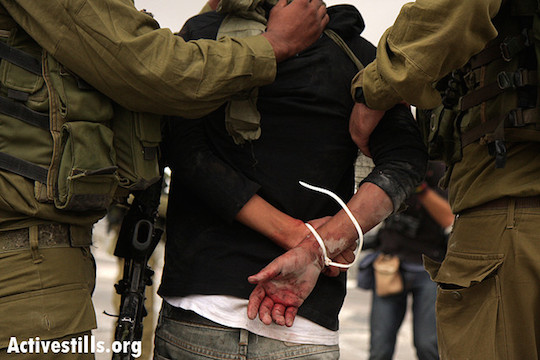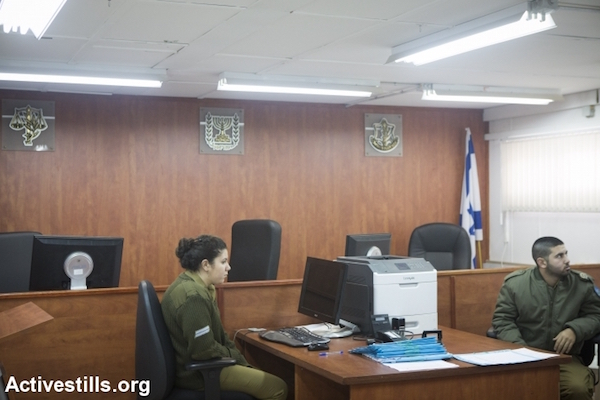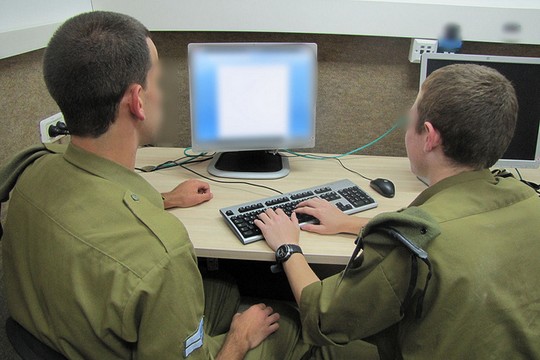Roughly 150 Palestinians have been put on trial in Israeli military courts for alleged incitement on Facebook. Now, the army and Shin Bet are having a hard time proving what incitement is, and often times just give up. Instead of releasing suspects as its own courts order, the army is putting them in administrative detention.
By Hagar Shezaf

In a small caravan that serves as a courtroom at the Israeli army’s Ofer Military Court, a boy in his late teens from the West Bank village of Silwad is standing trial on charges of incitement on online social networks. In the hearing, which lasts only a few minutes, the military prosecutor argues that the fact that the teen shared a photo of a martyr constitutes a threat to the security of the region; the defense attorney counters that sharing a photo falls under the right to freedom of expression.
According to Palestinian prisoners’ organization Addameer, this is one of roughly 150 cases that have been brought before Israeli military courts since October 2015 in which sole charge was incitement on social media, or the central charge alongside allegations like “providing a service for an unlawful organization.”
Attorneys for the Palestinian Prisoners Club say they have represented around 40 cases in which incitement on social media was the only or main charge since October. “Before October we rarely saw these types of cases, but in recent months we are seeing more and more of them,” Attorney Munder Abu Ahmad says. “The [authorities’] approach is that if you wrote a post on Facebook, that means you are about to pick up a knife and head to Damascus Gate.” (A large number of stabbing attacks have taken place at Damascus Gate in the Old City of Jerusalem since October.)
Indeed, not too long after the latest wave of violence began, the Israeli authorities seemed to have reach a consensus that Palestinians’ primary motivation committing acts of violence is incitement – and specifically incitement on online social networks. A document published by the Shin Bet in early November says the attackers can be characterized as youths who are not part of any political framework and who “draw inspiration” from social networks. According to the Shin Bet report, many of the attackers “employed imitation [sic] which is common in the web” (i.e. they are copycat attacks).
Not enough Facebook friends? How about your friends’ friends
The world of social media is still relatively new. The entire question is also new for Israel’s military court system and it is being asked, for instance, what actually constitutes incitement on Facebook? Does one’s social media presence need to have wide reach? Does the post in question need to have been cited by an attacker as their motivation? From a review of nearly a dozen incitement cases in military courts, it appears there is no single answer.
Of the cases we reviewed, some of the Palestinians indicted for incitement having as many as 1,000 “friends” on Facebook but others as few as 150. The “likes” the posts themselves get range from as low as seven to more than 140. Sometimes the military prosecution will distinguish between content the defendant created himself and posts and photos others created, which the defendant merely shared.
In one case the prosecution argued that even if the accused didn’t have an impressive number of “friends” himself, because one of his Facebook friends had far more followers, the material could therefore be disseminated far wider, and it is therefore possible that one of those people – one of the friend’s friends – might be influenced by it and carry out a violent attack.
Palestinians have also been charged for posting and sharing various types ideas and opinions, calls to action — or a lack thereof. In December, the Ofer military court heard the case of a young man from Hebron who posted on Facebook: “To all citizens of Jerusalem and ’48 (Israeli territory inside the Green Line, h.s.), whenever you see a settler, yell ‘terrorist’ in Hebrew and yell that he is a Palestinian and that he has a knife so he’ll be killed by the Occupation.” The post in question received five “likes.”
Another indictment cites a post that received 72 “likes”: a photograph of the body of Malek Shahin, 21, from Dheisheh refugee camp, who was killed by Israeli army fire in December. Along with the photo was the text: “my homeland taught me that the blood of martyrs demarcates the borders of our homeland.” In another case, the defense attorney noted that the martyr’s photo in question, which the accused had “shared,” was in fact a photo of the defendant’s own brother who had been killed by the army.
For Palestinians, even calling for a protest is ‘incitement’
Palestinian civilians living in the West Bank are subject to the Israeli military court system, in which laws are not exactly legislated — they are military orders. The differences between those military codes and Israel’s civilian law are often significant. Take for example the difference between the crime of incitement in the army’s “Order Regarding Security Provisions” (to which Palestinians are subject) and the same offense under Israeli law: the military code says incitement can constitute speech “which may harm public peace or public order”; Israeli law sets a far higher bar and requires that there be “a real possibility that [the publication] will result in acts of violence or terror.”
“In the [occupied] territories, something that might even lead to a protest is an offense. In Israel, a protest would not be a crime.” explains Attorney Smadar Ben Natan. “But of course the differences are not only in the letter of the law. In Israel freedom of expression and freedom of assembly are recognized as constitutional rights; that is not the case in the West Bank.”
The definition of incitement in the military order, to which Palestinians are subject, is as broad as “possessing an object with the intention to influence public opinion,” or even publishing praise, sympathy or support for a hostile organization or its actions.
The Shin Bet’s attempts to prove causality
As the number of incitement cases increases, the Israeli army and intelligence agencies seem intent on proving, at least to the courts, that publishing messages sympathetic to “terrorist attacks” on social media proves that someone is dangerous and that their posts might incite others to commit attacks. To that end, the military prosecution recently submitted a Shin Bet expert legal opinion about patterns of behavior on Facebook and the danger of incitement on social networks.
The expert opinion was submitted as part of the prosecution’s appeal against a judge’s order to release a young Palestinian man from the village of Silwad. The youth had been charged with sharing a Facebook video that showed stone throwing along with the text: “get up and fight and set the [West] Bank alight.” The army requested that the court, just like in all of the cases examined for this article, keep the defendant in prison for the duration of legal proceedings.

That document has since been quoted by the prosecution in many other appeals, and is being treated as a comprehensive reference document for the entire subject of incitement on social media and how the court should approach such cases. For example, as part of another prosecutorial appeal, the army argued it was not required to prove a terror organization actually benefited from the publication in question, or that an act of violence took place as a result.
The Shin Bet expert opinion was the mainstay of the military prosecution’s appeal concerning the young man from Silwad, has been relevant in a number of cases since, and will be in those that have yet to be heard.
On the surface, the document appears to be comprehensive and methodical.
According to the Shin Bet, of all the terror attacks carried out in 2015, 159 were committed by individuals who had no support from any terrorist infrastructure. With 73 of those “lone attackers,” the intelligence agency found “exceptional and extreme” writings or posts it said were clear indicators of their intention to carry out an attack, including a farewell note.
Furthermore, the Shin Bet wrote, it “received information” according to which those same lone attackers were influenced by incitement and was therefore able to draw a direct correlation between the attacks, and social media posts and publications on the Internet and television.
Fuzzy math
If you noticed something strange there, you’re not alone; the judge was also not convinced. He ruled that the Shin Bet opinion failed to demonstrate a causal relationship between social networks and terror attacks, and was written in a misleading or biased way.
The way the numbers are presented by the Shin Bet, the reader is led to believe that more than half of ouths who carry out attacks first published warnings of their intentions on social networks. But in reality, the data shows that of all the “lone attackers” since October, 73 percent had social media accounts, and only 63 percent of that sub-group declared their intentions online. In other words, only 46 percent of all the attackers published “extreme” posts before setting out to commit an attack, according to the judge’s calculations. The conclusion is actually the opposite of what the Shin Bet contended: more than half of Palestinians who carried out attacks did not write about their intentions on social media.
That distinction is crucial for every incitement trial, most of which rely on the alleged causal link between violent incidents and statuses on Facebook. The data simply does not back up that assertion.
The judge also wrote in his decision that the Shin Bet did not present cases of attackers who said their actions were influenced by “correspondences on Facebook,” only by news and video clips. Additionally, he added, no contextual data was presented showing the number of Facebook accounts belonging to all residents of the Palestinian territories, “how many of them published ‘extremist materials’,” and how many of those people carry out violent acts. That argument is particularly paramount because it addresses the one thing missing from Israel’s approach to the entire issue of Palestinian incitement – perspective.
A nuanced understanding of the social and political discourse in the West Bank is integral to any discussion of the boundaries of freedom of expression. It is also extremely important when attempting to distinguish between protected free speech and instances of incitement that pose actual danger, therefore requiring preventative measures (arrest or imprisonment). An excellent example is the use of the word “shahid” (martyr) and the posting of martyr photos to Facebook. What Israelis generally interpret as incitement, most Palestinians would describe as a common expression of respect for the dead or those killed in a political struggle. In these cases, the deep chasm between the Palestinian and Israeli discourse is front and center.
‘If you release him, we’ll just use administrative detention’
The military prosecution’s appeal to keep the young man from Silwad in prison was rejected. The judge ruled that not every “fiery” Facebook post justifies imprisonment. For that, he wrote, there must exist: a post that demonstrates real intentions to commit violence or ongoing calls for carrying out violence; a large group of followers; and a period of escalated violence.
But that’s not the end of the story. The defendant, who had a grand total of 150 friends on Facebook, is currently being imprisoned without trial in administrative detention for three months. Why? When the military prosecution filed the appeal, it warned the judge that if he ordered the defendant’s release the army would instead submit an administrative detention order.
And that’s exactly what happened.
“People charged with incitement who are ordered released are immediately put on an administrative detention track,” Attorney Abu Ahmad adds. “The prosecution declares its intentions [to do so] in advance.”
As the military prosecution itself explained in yet another appeal: there is no need to prove that the inciting material actually led to violence. And indeed, the practice of putting young Palestinians accused of incitement into administrative detention instead of charging them with a crime appears to be on the rise, according to rights group Addameer, which says it has seen dozens of such cases in recent months.
“They interrogated me for 10 minutes, during which they asked me only about a post I published on Facebook,” recalls Jurin Qadah, whom Israeli soldiers arrested in the middle of the night at her home in a village near Ramallah. “I posted a quote from a poem “If I leave suddenly keep me in your prayers”, and they kept asking – why did you post it? Do you want to die?”
Qadah was put in administrative detention for three months, without charge or trial.
This seems to only be the beginning of Israel’s battle in social media. This week, a new government taskforce will “tackle anti-Israeli incitement on social media.” In addition to monitoring social media, the taskforce will reportedly seek to hold service providers (such as Facebook or Twitter) accountable for incitement that is not removed from their platforms. Like in other places across the world, cracking down on social media has maybe begin during a peak period of violence, but will probably be here to stay for as long as social media networks remain the primary tools of expression.
Hagar Shezaf is a Jaffa-based freelance journalist. A version of this article was first published in Hebrew on Local Call. Read it here.


